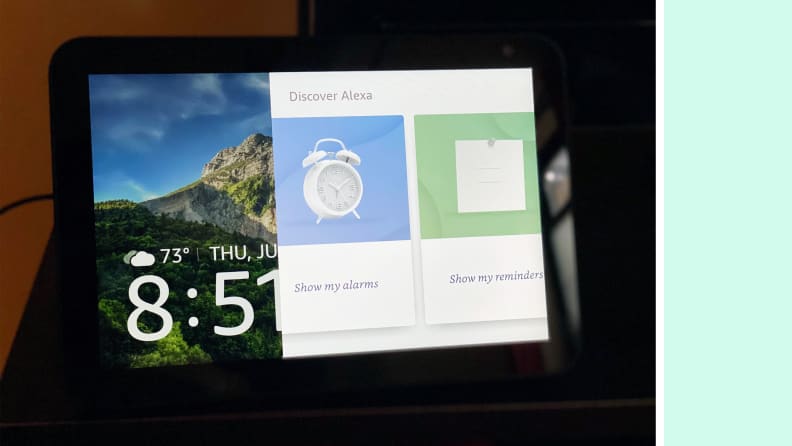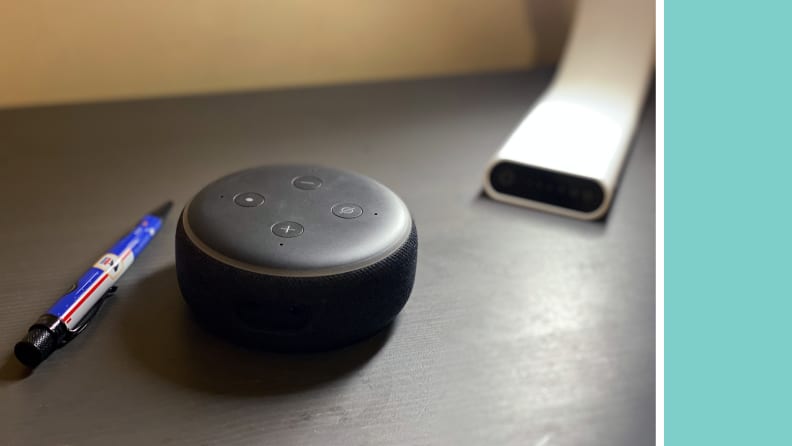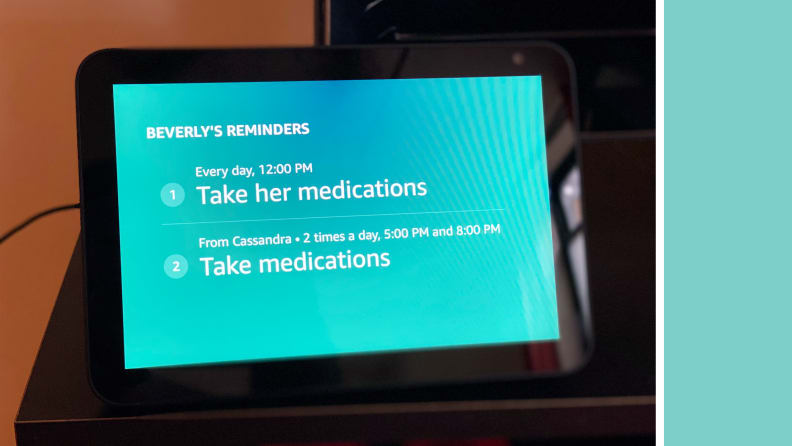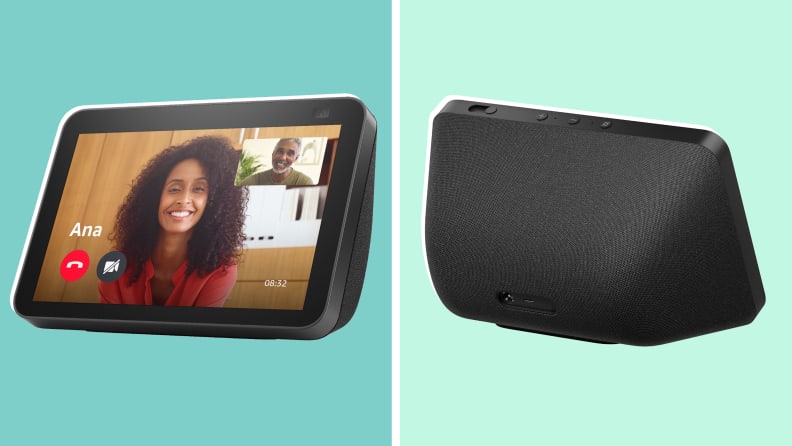Echo Show 8 Accessibility Review
This smart speaker is an entertainment system and personal assistant in one
Products are chosen independently by our editors. Purchases made through our links may earn us a commission.
-

Amazon Echo Show 8 (2nd Gen)
Pros
-
Great tool for communication
-
Appropriately focused on security
-
Supports Matter
Cons
-
Web browser can be buggy
-
When my mother began showing signs of Parkinson’s 10 years ago, her symptoms were slight and didn’t impact her daily life to a severe degree. Over the past few years, however, her mobility has become increasingly challenged, and she’s lost significant strength and dexterity in her hands and fingers.
Paired with advanced arthritis and a general discomfort with technology, she’s struggled learning to use a smartphone and tablet, not to mention the significant strain of trying to press small buttons on many devices. When her hands are shaking, and they often are, as shaking and tremors are exceedingly common among people with Parkinson’s, pressing any type of button proves impossible.
I thought a voice-activated device might be easier for her to operate than a touch-based device, so I decided to test out an Amazon Echo Show 8 2nd Generation (available at Amazon for $129.99) smart speaker. Could a sophisticated smart device overcome the limitations of a progressive disability? That’s precisely what this Echo Show 8 review aims to find out.
What does an Echo Show 8 do?

The Amazon Echo Show 8 acts an all-in-one device to suit your needs.
My mother often relies on other people to turn devices on and off or to bring her a dictionary or phone, because it was placed somewhere that would be difficult for her to reach in her wheelchair. The Echo Show is an entirely voice-activated device, so I anticipated her being able to play music, make calls, and get answers to questions herself without having to ask for assistance.
You simply say “Alexa” to activate it, then ask a question (“What time is it?” or “What’s the weather today?”) or state a command (“Play classical music,” or “Call Cassandra”). Alexa is sort of like a virtual personal assistant, there to help you out with whatever you need.
The device is made by Amazon and is linked to your Amazon account (and potential Amazon memberships like Prime, Audible, and Amazon Music), but it doesn’t require any additional subscriptions as long as you’re fine with hearing ads.
Amazon Music is the default music platform, but you can connect it to your own Pandora, Spotify, or Apple Music account as well. For watching videos, TV shows, and movies, it can also connect with Amazon Prime Video, Netflix, Max, or Hulu. You can listen to the news (NPR, ABC, NBC, or FOX), get traffic updates, and make and receive voice or video chats.
You can also set and check timers, medication reminders, and calendar events like doctor’s appointments (all with your voice), then Alexa alerts you when the timer is up or when you have an upcoming event.
It can even control compatible devices, such as smart lighting, so you can turn the lights on or off with the sound of your voice, provided you have the right companion equipment in your home. The device is 8 inches by 5.4 inches by 3.9 inches and weighs 2.3 pounds. It has an HD touchscreen smart display, but it’s designed to be activated by your voice, so it’s not typically necessary to use it. In short, the Echo Show is Amazon’s answer to something like Google’s Nest Hub.
I rotate between my mother’s home in Milwaukee and my apartment in New York City, and I often bring her to stay with me in New York City so I can help care for her without completely abandoning my life here. Since I have no other family or friends in New York to help care for her, I wanted to try the device here. When it arrived, I set it up in the living room, showed my mother how to give it commands, and went into my room to watch a movie.
She stayed in the living room, reading and listening to classical music. A particularly loud (and long) concerto came on, so I poked my head into the living room and asked her to turn it down. She looked up, momentarily confused, quite possibly because she is so accustomed to being the person asking for help and not the one being asked to help. Once she realized she had the power to adjust the volume on a device across the room all by herself, she asked Alexa to “please turn down the volume” and smiled at me, with an unmistakable look of satisfaction on her face.
We also tried out the palm-sized smart speaker, Echo Dot, which I put in my mom’s bedroom in my apartment. While the device works well for listening to music, Alexa’s sound quality is much lower than it is on the Echo Show 8, so its answers are harder to understand. In true COVID fashion, it sounds like Alexa is wearing a face mask on the Echo Dot, so we prefer the lager Echo Show as a primary smart hub thanks to its stereo 2-inch speakers. That said, the Dot works fine as a secondary option.
What I like about the Amazon Echo Show 8
It can understand soft, mumbled speech

No matter your way of speaking, the Echo Show understands anything you're trying to say.
Parkinson’s can severely impact one’s speech, as the person struggles to manipulate their tongue, project their voice, and open their mouth to produce words. Swallowing is also a frequent challenge, causing the mouth to fill with saliva, which, in turn, contributes to slurred speech, stuttering, stammering, and mumbling.
Like many others living with PD and similar conditions, my mother’s voice often hesitates, stutters a bit, and she must put in considerable effort to enunciate words that would otherwise come out as a soft mumble. She speaks very softly, sometimes to the point of a whisper, and there are often long gaps between her words. Given the difficulty my family and I have hearing my mom, even when we’re just a few feet from her, I was shocked that Alexa could pick up what she was saying from 10-15 feet away.
As her speech processing and delivery are a bit slower than average, my mother often starts to ask a question before she's figured out exactly what she wants to say. As a result, her questions sometimes come out jumbled and unclear, but Alexa is usually able decipher them regardless.
It’s versatile, from watching Netflix to receiving calls
As mentioned previously, the Echo Show 8 can play the news and movies, get traffic updates, make voice and video calls, and control connected smart home devices like cameras and lights.
For instance, if you have smart lighting, you can ask Alexa to turn the lights on, off, up, or down. While my mother primarily uses the Show 8 for listening to music, the device’s features could be very appealing and helpful for others, particularly older or disabled adults who live alone.
As a lifelong lover of classical music and a trained pianist (who is no longer able to play as a result of the Parkinson’s and arthritis), my mother listens to classical music pretty much the entire day. The free music stations are quite extensive but, unless you pay for a subscription, you’ll have to listen to ads every few songs. I refuse to pay for another subscription service, but I hate listening to ads, so I connected the device to my existing Pandora account instead.
In practice, she enjoys making song requests or asking who the composer is instead of asking me to walk over and read the screen (which is what happens at her own home with the Sirius XM radio I bought her). She also likes to ask Alexa what time it is, what the weather is like, and questions related to crossword puzzles she’s working on.
With Alexa, she’s able to call out her questions and receive answers to them without needing to ask for assistance, which allows her to maintain some independence and frees up those of us who care for her. I’ve also programmed her medication reminders into the device so she gets an audio alert whenever it’s time for her to take her pills.
Alerts are clear and repeated
I set up several medication reminders for my mom, which sound simultaneously on the Echo Show in the living room and the Dot in the bedroom. My mother doesn’t always hear the first alert, so I appreciate that it gives a second reminder and shuts off instead of constantly sounding in the background. This way, it’s not a problem if she's napping or forgets to say “Alexa, turn it off” while I’m on a work call.
It’s worth noting the sound of the alerts is tied to the device’s overall volume level. If the volume is set to low, then the alert will also be low. If my mother is listening to a classical music piece that is especially loud, she’ll ask Alexa to turn down the volume. If the alarm happens to go off when the volume has been turned lower, the alarm will also be quiet, and she may not hear it.
It’s sort of like a digital companion
My mother spends a lot of time alone. It’s challenging for her to leave the house and get around, but my sister and I live busy lives, so we often have no choice but to leave her alone. Not only has the Echo Show 8 proven to be helpful and entertaining for her, but it’s also served as a sort of digital companion.
I believe my mother feels less alone at home when she’s able to play music and ask questions to a friendly voice. This device certainly isn’t going to solve the loneliness problem facing far too many seniors, but it certainly has helped ease those negative emotions a bit for my mom.
What I don’t like about the Amazon Echo Show 8
It takes time to learn the technology

Lots of obligatory syncing can become an annoyance when setting up Echo Show for the first time.
The Echo Show 8 is not a complicated system. Amazon has done a pretty good job of making its menu and commands simple and intuitive. That said, for someone who doesn’t own a computer and just got their first smartphone a few months ago (and still struggles to use it), my mother was only able to use the device because I set it up, learned the commands, and taught them to her.
She occasionally calls out commands to “Alissa” instead of “Alexa,” or she forgets to say a name altogether and the device doesn’t begin listening (or responding) until it hears the word “Alexa.” For someone unfamiliar with technology, there may be a small learning curve to maximizing the Echo Show’s potential.
Alexa doesn’t work perfectly
Overall, the Echo Show works quite well, and it’s done a very good job of understanding my mother’s voice. Occasionally it can't understand her voice (likely because of her soft, mumbled speech), but sometimes it simply misunderstands her commands and questions even when she has spoken quite loudly and clearly.
As a classical music lover, her very first question to Alexa was to "please play 'Eclogue’ by Gerald Finzi" (a choral composer). Instead, Alexa began playing an audio book I have in my Amazon account called Bury Me at Wounded Knee. We were both confused, but when my mother tried again, Alexa understood. Since we didn’t want to pay for the Amazon Music subscription, the device wouldn’t play that particular song, but it did play a station (with ads) based on Gerald Finzi.
The device listens to you
Yes, this is the whole point of the device—it listens to you so it can answer your questions, but many of us have privacy concerns with so-called “listening devices” like the Echo Show. Amazon insists it won’t sell your information and that the device only listens when someone activates the device by saying “Alexa.” There’s also a handy button to turn off the mic/camera and a built-in camera shutter (which I always have off).
That said, many people simply don’t believe that Amazon isn’t always listening in the background, using what it hears for its own financial benefit. Just to be on the safe side, I turn off the device whenever my mom isn’t using it, including overnight, and when she’s not visiting because I’m paranoid like that.
You have to give access to your phone’s camera to make voice calls
The video chat function is a nice feature on the Echo Show 8 since it could help families and friends stay connected using the device’s 13-megapixel camera. That said, I only wanted to use the voice call feature so I could check on my mom while I was out running errands.
I have a landline (I know, we’re a dying breed), and I always leave a cordless unit with my mom when I’m out, but I also liked having the option to speak to her through the smart speaker in case the cordless unit’s battery died or my mother couldn’t remember or find my phone number.
To call her on the device from my cell phone, Amazon forced me to give access to my camera even though I was only making a voice call, not a video call. I found this requirement unnecessary, annoying, and suspicious. (Again, I’m more paranoid than the average person.)
When I got home, my mother told me that when I called, she saw and heard my name on the device (which is good), but that Alexa "wouldn't let" her accept the request. We tried a few more times with me calling from the next room and it worked just fine, so it’s possible my mother may have said only "answer" instead of "Alexa, answer." Alexa is the Simon Says of smart home tech, so without the magic word, its commands are rendered useless.
Should you buy the Amazon Echo Show 8?
Yes, especially those with dexterity issues or low vision

If you're looking for a device that can do a lot with just your voice, the Echo Show 8 is fantastic!
The Amazon Echo Show 8 2nd Gen smart hub could be a great option for anyone who has difficulty using a smartphone or computer keyboard, either due to unsteady hands, lack of dexterity, restricted movement of any kind (such as muscular dystrophy), or limited familiarity with technology.
It could also be helpful for anyone with impaired vision, as the device allows you to ask questions, listen to music and news, watch TV, make/receive calls, and get updates and reminders all with the sound of your voice. It could be especially helpful for people who live alone or who have difficulty getting around the house. And, for those who don’t need voice, the Alexa Smart Display is equally capable and screen reader-friendly.
While the device isn’t especially expensive, older versions are available that have most of the features for half the price. The bottom line is, as a premium or budget-friendly gift, there’s little reason to not consider adding an Echo Show 8 to your shopping cart.
The product experts at Reviewed have all your shopping needs covered. Follow Reviewed on Facebook, Twitter, Instagram, TikTok, or Flipboard for the latest deals, product reviews, and more.
Prices were accurate at the time this article was published but may change over time.







